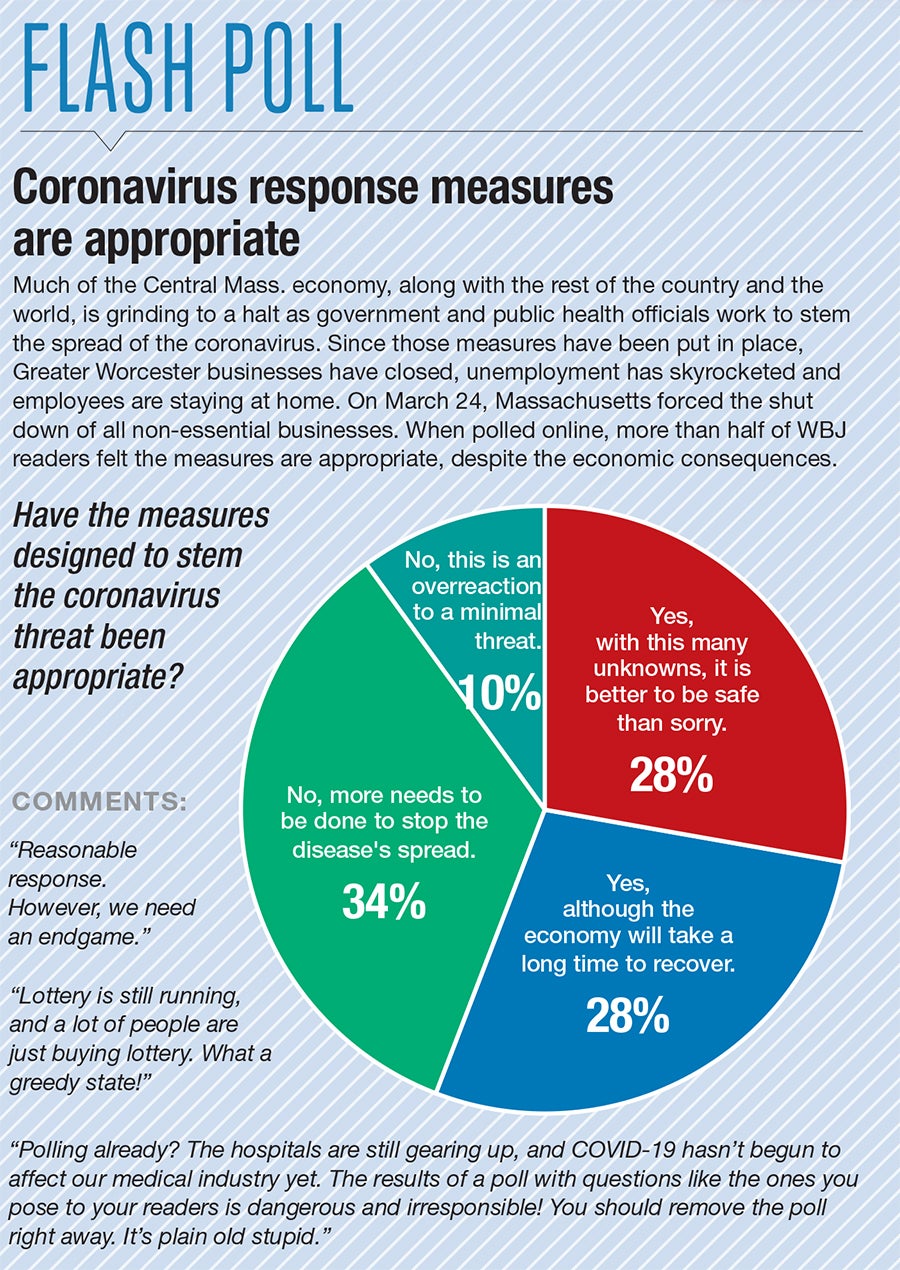As the COVID-19 pandemic wears on and Central Massachusetts business owners adjust to a shifting economic and regulatory environment, area experts are cautioning company heads to stay abreast of ever-changing tides – and to make sure emergency plans are in place to protect work and cash flow.
Get Instant Access to This Article
Subscribe to Worcester Business Journal and get immediate access to all of our subscriber-only content and much more.
- Critical Central Massachusetts business news updated daily.
- Immediate access to all subscriber-only content on our website.
- Bi-weekly print or digital editions of our award-winning publication.
- Special bonus issues like the WBJ Book of Lists.
- Exclusive ticket prize draws for our in-person events.
Click here to purchase a paywall bypass link for this article.
As the COVID-19 pandemic wears on and Central Massachusetts business owners adjust to a shifting economic and regulatory environment, area experts are cautioning company heads to stay abreast of ever-changing tides – and to make sure emergency plans are in place to protect work and cash flow.

“Planning and preparedness is absolutely critical,” said Rory Fazendeiro, a partner at Bowditch & Dewey, LLP and head of the Worcester firm’s COVID-19 task force.
While precisely what kind of planning will help businesses varies widely based on company size and industry, Fazendeiro said take basic steps like reviewing important agreements critical to keeping your business running. This includes going over customer and vendor contracts, as well as lease agreements, and evaluating the degree of flexibility, given the uncertainty of the times.
“There’s a variety of agreements that form the basis of the businesses our clients undertake that are critical to being prepared and to moving forward,” Fazendeiro said.
Understand employment law

Aside from taking stock of the various contractual arrangements, business owners should take care to follow all coronavirus-related federal and state legislation, especially the Families First Coronavirus Response Act, a new law going into effect in April, said Robert Kilroy, chair of the labor, employment and employee benefits group at Worcester law firm Mirick O’Connell.
Among other provisions, the law impacts paid leave benefits businesses are required to offer employees impacted by COVID-19, Kilroy said, urging business owners to stay on top of its implementation.
"It's somewhat complex, but that's the major act that the employers have to be concerned with, and how that might interact with their own paid-time-off policy as well as the Massachusetts Earned Sick Time law, for someone who has symptoms of coronavirus,” Kilroy said.
In that realm, Kilroy underscored the importance of providing unemployment benefits information to workers who are temporarily laid off or furloughed, and of being mindful of time spent communicating with employees who are not currently working. That includes making phone calls and sending emails that receive responses, he said, because those communications can legally be considered working hours.
“If [they're] hourly, you're going to have to pay them for that time,” Kilroy said. “And if it's salary, then they performed work in the workweek which means they're entitled to full pay for the entire week.”
He advised business owners should confer with whatever legal counsel they have, if they can, to ensure they are complying with the aforementioned regulations, as well as any that may be developing.
“If you spend a little bit of time on the front end getting it right, you can save yourselves a lot of heartache and headache and possibly damages, in the event of a lawsuit,” Kilroy said.
Keep strong banking relationships

Of course, as non-essential businesses in-state remain shutdown under Gov. Charlie Baker’s order from March 24, businesses are dealing with immediate cash flow challenges, making it difficult or even impossible to know if or when doors can reopen and normal operations might resume. Dave McManus, a co-managing partner at Westborough accounting firm AAFCPAs said business owners should take a close look at their banking relationships, including where and how they store their cash.
As uncertainty looms, he said, it’s possible that banks may freeze lending opportunities. If cash access is a problem, or is projected to become a problem, McManus said owners should consider drawing on lines of credit sooner, rather than later.
Moreover, he said, owners should look at their respective Federal Deposit Insurance Corp. limits and evaluate how much of their money is actually insured.
“We’re talking to [our clients] about maybe moving money around at different banks,” McManus said.
Like Kilroy, he emphasized the importance of tracking developments surrounding the Families First Coronavirus Response Act, as well as having an emergency plans in place to ensure day-to-do operations can continue to take place.
"Now is the time for businesses to really be looking at what type of remote access or remote cloud-based applications they have to be able to keep business going, even if they can't get into the office,” McManus said.
This might include the obvious, like video conferencing and document sharing, but also electronic bill pay systems and electronic deposit mechanisms, too, he said. Going through these checklists might be a challenge initially, but in his view, McManus said, it’s a learning experience growing in value over time.
“What you put in place in terms of being able to work remotely will really pay off dividends in the future,” McManus said.


